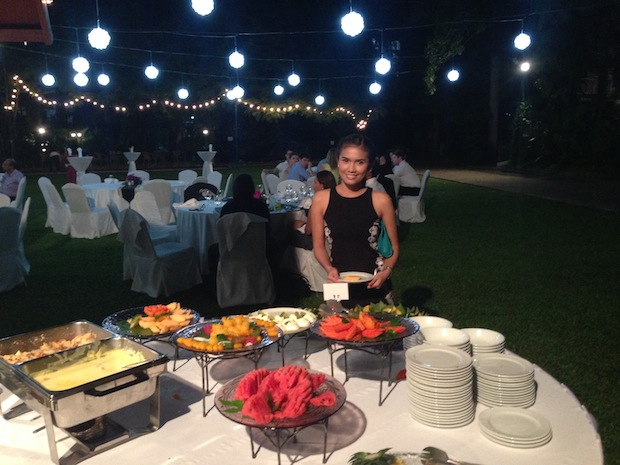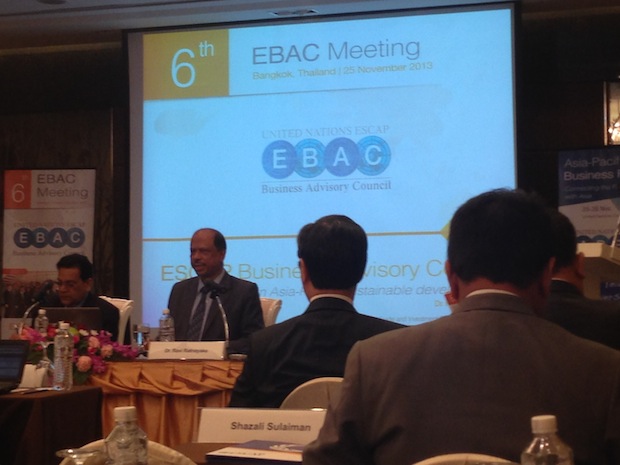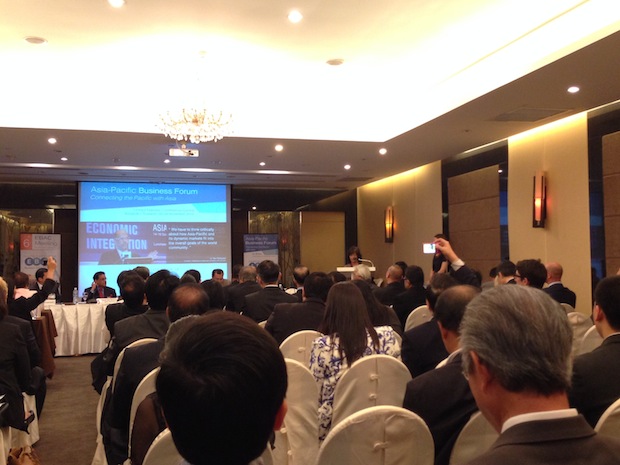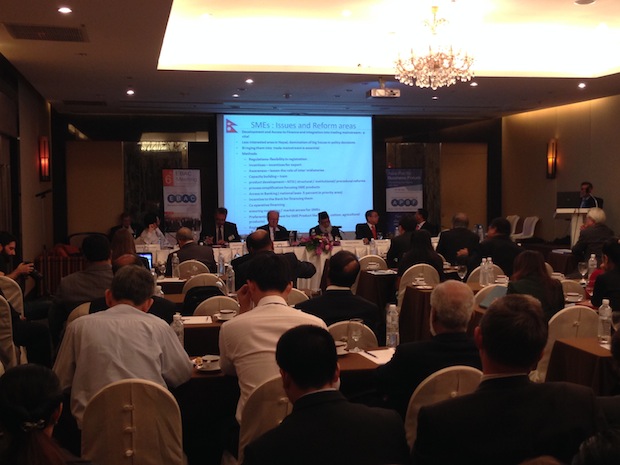
The 6th and my first EBAC meeting took place on Monday followed by the one and half day 10th annual Asia Pacific Business Forum. The great event got kickstarted on Sunday at the British Club in Bangkok, where we gathered together with the Connectivity Task Force lead by Barbara Meynert. It was also the first time for the whole team to meet together in person. We had had fractal meetings with parts of the team in Bangkok and Hong Kong, but this was the first time the full team was present. It’s just amazing how important meeting in person is, and how much more effective it is compared to exchanging emails and speaking over phone/Skype. The working team consists of 10 people with all very unique skills, and is set to deliver an online SME platform to connect and support the SMEs in the Asian region.
First of all, it’s a fun project to work with, but it is also a very important for the regions growth, which has been now stressed in many occasions. Over the EBAC welcome dinner, hosted generously by Barbara, the UN ESCAP Executive Secretary Ms. Noeleen Heyzer accented the importance of SMEs and the sustainable connectivity between them. The same was brought up by U Win Aung, the President of the UMFCCI in his speech at the Myanmar Development week few months ago in Yangon.
Sunday
The welcome dinner on Sunday was very well organized, despite the on going demonstrations near the UN compound, in close proximity to the Royal Princess Hotel where most of the guests were staying. The food was excellent and despite the rainy season the weather was on our side. It was very nice to have the opportunity to meet in a less formal occasion with most of the people attending the EBAC meeting in the following day. Also it is always great to meet the guys (and girls) from the ESCAP team here in Bangkok.

I received an email later Sunday night saying that the venue had been changed from the UN compound to the Princess Hotel due to the demonstrations, which turned out to be the right decision. All roads to the UN compound were totally blocked and would have been a disaster trying to get people in and out.
Monday
The two-day program started with the 6th EBAC meeting, and was opened by the Chief of UN ESCAP Trade and Investment Division Dr. Ravi Ratnayake and EBAC Chairman Mr. Datuk Seri Mohamed Iqbal Rawther from Malaysia. The meeting agenda consisted mostly of updates on EBAC Task Force activities and other Task Force related matters. The Connectivity Task Force, lead by Barbara Meynert and which I am a member of, seemed to be one of the most active and well managed amongst all the EBAC Task Forces, as it was constantly used as an example how the Task Forces should be run. Barbara presented the updates on the progress and kindly gave the opportunity for the new EBAC Associate Members in her Task Force, Pedro Eloy, Philip Leung and myself, to introduce ourselves.

The Asia Pacific Business Forum kicked off after lunch, and despite all the hassle around first changing the location from Sydney to Bangkok and second the trouble caused by the demonstrations, the speaker line up was very good and convincing. The conference room at Royal Princess Hotel was full, and quickly counting there were over 100 people in.
The opening session included an impressive list of speakers. In addition to previously mentioned Dr. Ravi Ratnayake and Mr. Mr. Datuk Seri Mohamed Iqbal, Dr. Noeleen Heyzer, the Executive Secretary of UN ESCAP gave an opening statement. ThaiBev President and CEO Mr. Thapana Sirivadhanabhakdi delivered a keynote on Entrepreneurship in Asia and the Pacific. H.E. Mr. Robert Aisi, the Chair of the Pacific Small Island Developing States spoke on business and the international community’s sustainable development goals, and finally Mr. Chartsiri Sophonpanich, President of Bangkok Bank had the final thank you note.

The first plenary session speeches were focused on building a sustainable Pacific private sector. It was moderated by Mr. Caleb Jarvis, Trade Commissioner at Pacific Islands Trade & Investment. The panelists included Ms. Sally-Ann Hughes, Export Marketing Officer, Secretariat of Pacific Community, Ms. Pornsri Laurujisawat, Vice President of Charoen Pokphand Foods, Mr. Tekeeua Tarati, President of Kiribati Chamber of Commerce & Industry, Mr. Sam Savou, Trade Commissioner, Pacific Islands Trade & Invest, Beijing, Mr. Nitij Pal, Vice President of Australia Pacific Business Council and Mr. Felix Cordova, President and CEO of Edward Marcs Phils Inc.
I learned a lot about the Pacific Islands. I always had pictured the two largest, Australia and New Zealand, to be there, but never realized how many small island nations there are in between Indonesia and these two. These small island nations have small populations and different sets of rules and regulations, which makes it a haven for lawyers, but sets certain challenges for doing business.
Overall I liked the first day, but for an ‘active’ person (slightly ADHDish perhaps) sitting still and listening speeches for all day can be a little too much. Getting a taxi home turned out to be more difficult than I thought. I waited an hour and half for the car and finally reached home after few hours. The taxi had to drive through the demonstrations area in the Democracy Monument to reach the highway, but the scene seemed quiet in the evening.
Tuesday
Tuesday got started with welcome address from Mr. Tariq Rangoonwala, Chairman of Rangoonwala Group of Companies. In terms of participant number Tuesday seemed quieter. Perhaps the fear of getting stuck with traffic had scared part of the local audience away.
The first plenary session of the day, moderated by Ms. Barbara Meynert looked into linking the Pacific with Asia, and what does it mean for business. Barbara had had a rough morning. She had decided to change her speech the night before and worked her new angle 4am, just couple hours away from the session start. Nevertheless, she managed it well and delivered three important key points:
- The Island nations could utilize the East Asian growth model, flying geese model, where production of commoditized goods would continuously move from the more advanced countries to the less advanced ones.
- Utilizing the internet economy, which would allow easier access to education (e.g. Khan Academy, Coursera), and various sources of funds (e.g. Indiegogo, Kickstarter).
- Understanding and welcoming the generational differences and using that to develop faster.
Barbara’s panel consisted of four speakers. Government leaders and International Agency representatives Mr. Mari Amano, Secretary General, Asian Productivity Organization, Mr. Hiroto Arakawa, Senior Special Advisor, Japan International Cooperation Agency Research Institute, and business leaders and institutions representatives Ms. Sisikakala Fine, Managing Director ProComm Services and Mr. Oudet Souvannavong, Secretary General, Greater Mekong Subregion Business Forum.

I unfortunately missed parts of the second plenary session moderated by Mr. Mahbubur Rahman, President of the International Chamber of Commerce Bangladesh. There were some urgent matters to be taken care of so I had to rush out after lunch. Overall I thought the whole event was well put together, despite the shadow casted by of venue change and on-going demonstrations in Bangkok.
Well done UN ESCAP Team!
